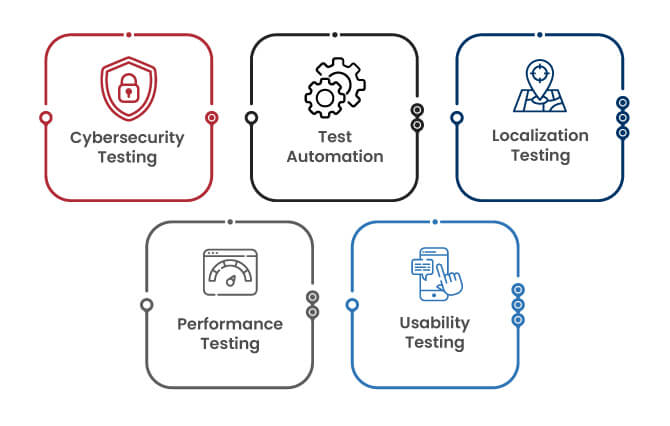Table of Content:
- Common Online Shopping Disasters to Avoid on Cyber Monday
- Importance of Cyber Monday Testing
- 5 Types of Testing for Cyber Monday Success
- Data Analytics with Data Warehouses
- Summary
The holiday season is approaching, and eCommerce businesses will look forward to one of the most hyped events of the year: Cyber Monday. In 2023, online shoppers spent around $12.4 billion on Cyber Monday, a 9.6% increase compared to 2022. And this year, this number is expected to reach new heights. For online shopping stores, making millions or billions during this period is not a fantasy but a reality. But all of that would only be possible if the website or mobile app is highly secure and can handle the sudden surge in traffic.
Whether because of the pandemic or people unwilling to camp out overnight for their favorite gadgets, modern-day shoppers now prefer to shop online for Cyber Monday. Retailers also have a clear picture of today’s customers’ buying habits. The best way to attract this audience is by offering visitors a seamless customer and buying experience. However, with all this online activity, the chances of cyber fraud also become high. The online marketplace will become a practical field day for malicious actors looking to steal user payment mode details and passwords. This is why conducting proper testing for the web and mobile apps before this event would work in everyone’s favor.
Common Online Shopping Disasters to Avoid on Cyber Monday
According to research, 57% of online attacks targeting retail websites were done by bots. If we talk about the biggest online shopping cyberattacks, JD Sports name will always come to mind. In 2023, cybercriminals accessed 10 million customers of JD Sports, a fashion retail brand. They gained access to the purchase history between 2018 and 2020. They got away with the user’s full name, delivery address, billing details, phone number, security code of payment card, and order details. This incident raised questions about JD Sports’ data management policies as the transaction records of millions of users were jeopardized.
This was just one cyberattack; there are plenty of examples of cyberattacks that affected both businesses and their customers. Let’s take a quick look at some of the common online shopping disasters that eCommerce businesses should be wary of:
DDoS Attack:
DDoS, or distributed denial of services attacks, involve criminals flooding the network with huge traffic volumes from different sources. This makes it difficult or impossible for the websites to deliver services as they should. DDoS attacks are very common in online retail businesses, and during Cyber Monday, bringing down the sites would become more frequent.
Consumer Journey Hijacking:
The consumer journey is a crucial brand differentiator for businesses, even greater than product and price. Consumers expect their engagement with a brand and its services to be seamless, secure, and a walk in the park. But hackers have also found their way around it. Consumer journey hijacking involves injecting unauthorized ads, usually a pop-up or a banner, into the user’s browser when they access eCommerce sites. They ask users to click on ads by promoting fake deals or prize redemption codes.
Card Fraud:
Hackers deploy malware bots to scan an eCommerce site for loopholes. In doing so, they steal the card numbers of users who have made transactions using credit/debit cards on that site. Gift card fraud is one of the common card fraud techniques in which bits scan for valid gift card numbers stored on a web application. Currently, Skimmers & Magecart attacks are also on the rise.
Importance of Cyber Monday Testing
People usually keep the same password for various accounts, which is very common. They don’t understand how vulnerable they are to cyberattacks. A leaked password on an eCommerce site equals a leaked password on the company’s network. Even after knowing that online scams are rising daily and the holiday season would make online shoppers a prime target of cyber threats, businesses tend to ignore the security measures they should have in place. This is why testing is important for Cyber Monday, as it helps businesses ensure a seamless and secure shopping experience for customers and online shopping sites. It can also help prevent potential security risks for businesses.
Testing the website and mobile application from all perspectives is important to prepare them for Cyber Monday. People will surf online stores billions of times to search for and purchase items. It would be a big responsibility to ensure the online stores function perfectly and securely so that users can have a seamless buying experience.
5 Types of Testing for Cyber Monday Success
Testing an eCommerce site or application before Cyber Monday requires a comprehensive approach. The goal is to ensure a secure and seamless customer experience during the busiest hours of the year. This is why one must conduct a complete QA of their eCommerce web and mobile apps before users hit to grab the deals on their favorite items. Let’s take a quick look at 5 testing types that are a must for ensuring Cyber Monday success:
Cybersecurity Testing:
This would be at the top when testing the website/mobile app. In 2023, the average total cost of the data breach reached $4.45 million during the Black Friday and Cyber Monday events. Poorly protected web and mobile apps can lead to severe consequences, such as degrading brand reputation and user trust, loss of revenue, operational disruption, etc. All these scenarios can be avoided by conducting the complete security testing of the application and testing the infrastructure that’s hosting the application. This would assist in knowing how well the site can function during an unauthorized entry. Businesses can ensure the security of online transactions, from order placement to the payment itself. This would ensure shoppers that their sensitive data is secure and that they can trust the brand.
Test Automation:
Leveraging automation tools to test the primary functionalities of the web or mobile app that users usually interact with can prove beneficial. This will not only be on Cyber Monday but also help you manage your website or mobile app in the long run. The overall development and deployment process time will be optimized, improving functionality with higher quality and security. AI and ML-based tools could play a big part in this.
Localization Testing:
During Cyber Monday, users will reluctantly translate anything they don’t understand (like content, pricing, currencies, etc.). Localization testing would allow eCommerce business owners to meet the linguistic and cultural needs of the shoppers and offer seamless UX for multiple regions. Compliance checks, GUI checks, and functional checks are some of the localization testing types that can assist businesses in making their website/apps ready for holiday sales.
Performance Testing:
The main component behind website failure during the holiday sales season is the sudden surge in user traffic. Consumers wait a year just for Black Friday and Cyber Monday sales and are ready to jump into the wagon when these two days finally arrive. The question is, “Can your website or mobile app handle it?” That’s when stress/load/performance testing steps in. Businesses can identify critical bottlenecks under peak loads and verify aspects like maximum possible load, response time, and the pressure level that the site can handle.
Usability Testing:
Smooth surfing, seamless navigation, and user-friendly content can help decrease the time needed to analyze the app’s functionality. Usability testing can detect vulnerabilities in UI/UX while allowing participants to interact with the eCommerce site/app. This way, the businesses can ensure the ease of use of their product while making it accessible to users with disabilities.
Why Partner with Tx for Cyber Monday Success?
Tx’s security center of excellence (SCoE) leverages proven methodologies, tools, and techniques to ensure the efficiency and effectiveness of testing and validation of eCommerce platforms. We utilize a technology-agnostic framework to thoroughly test website/mobile apps’ security, functionality, performance, and accessibility on different devices, browsers, OS, and payment systems. Tx can assist you in determining the best approach for testing and validating your critical web and mobile app issues and prepare you for Cyber Monday’s success. Our in-house accelerators, Tx-Automate and Tx-Secure, will monitor your product for any issues and provide remediation measures you can implement.
Tx-Automate can deploy comprehensive test automation solutions without developing test cases from scratch. Its custom reporting, seamless third-party integrations, and flexible execution settings allow it to configure/assemble test suites effortlessly by combining different automated tests and making them readily available for execution. This helps speed up the testing process, which can benefit your website/app when making it ready for Cyber Monday.
As Cyber threats will be more severe during the holiday season, businesses will need effective security testing practices and core security testing accelerators to secure their websites and apps. Tx-Secure, our unique security testing accelerator, has a specific set of processes, guidelines, tools, and checklists that make the security testing process quicker and seamless and ensure significant results. This framework can be used for monitoring security events and incidents in real-time across servers, networks, cloud, and workstations to ensure smooth operations.
Summary
As Cyber Monday approaches, eCommerce businesses must be prepared for a surge in online shoppers and potential cyber threats. Robust website and app testing ensures a smooth and secure shopping experience. Proper testing can help prevent issues such as DDoS attacks, card fraud, and consumer journey hijacking. By conducting essential tests, including cybersecurity, performance, usability, and localization testing, businesses can safeguard sensitive data, manage high-traffic volumes, and provide a user-friendly experience. Partnering with Tx ensures expert cyber security testing and validation to secure eCommerce platforms, allowing businesses to navigate the busy Cyber Monday period confidently. To know how Tx can help, contact our experts now.



